University: Sustainable Operations and Destination Report
VerifiedAdded on 2022/08/12
|12
|2662
|18
Report
AI Summary
This report provides a reflection on sustainable operations and destination management within the hospitality industry. It discusses the importance of sustainability, covering topics such as sustainable hospitality programs, ecosystem management, green marketing, and corporate social responsibility. The report explores the economic, social, and environmental dimensions of sustainability, emphasizing responsible production, consumption, and the role of consumers in driving change. It also delves into concepts like the Global Sustainable Tourism Council (GSTC), responsible marketing, and the integration of sustainability into business practices. The report highlights the need for businesses to align with consumer expectations, manage externalities, and adopt innovative approaches to achieve long-term sustainability. It also covers the key principles and frameworks relevant to sustainable development, innovation, and corporate social responsibility, emphasizing the triple bottom line approach and the importance of stakeholder engagement.
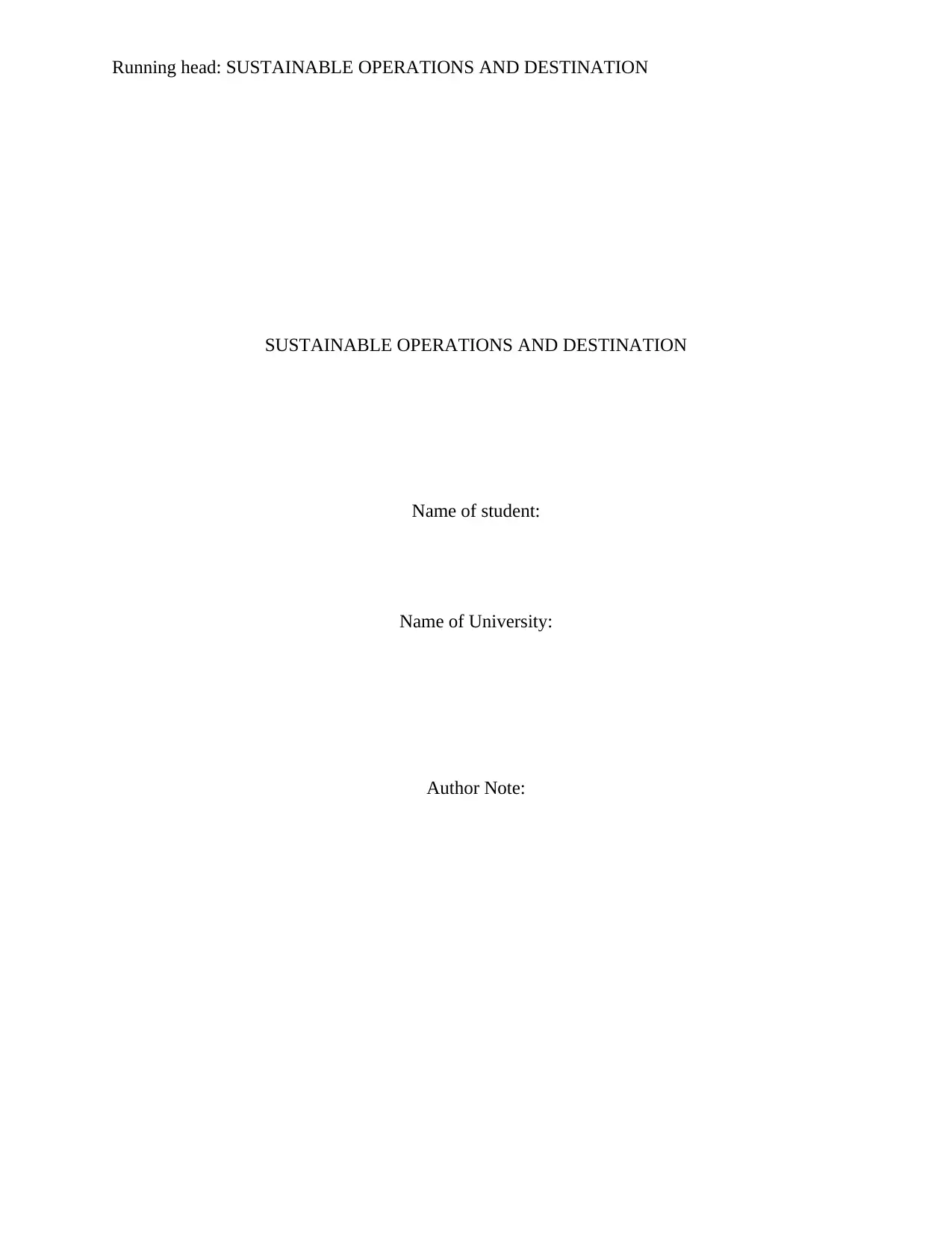
Running head: SUSTAINABLE OPERATIONS AND DESTINATION
SUSTAINABLE OPERATIONS AND DESTINATION
Name of student:
Name of University:
Author Note:
SUSTAINABLE OPERATIONS AND DESTINATION
Name of student:
Name of University:
Author Note:
Paraphrase This Document
Need a fresh take? Get an instant paraphrase of this document with our AI Paraphraser
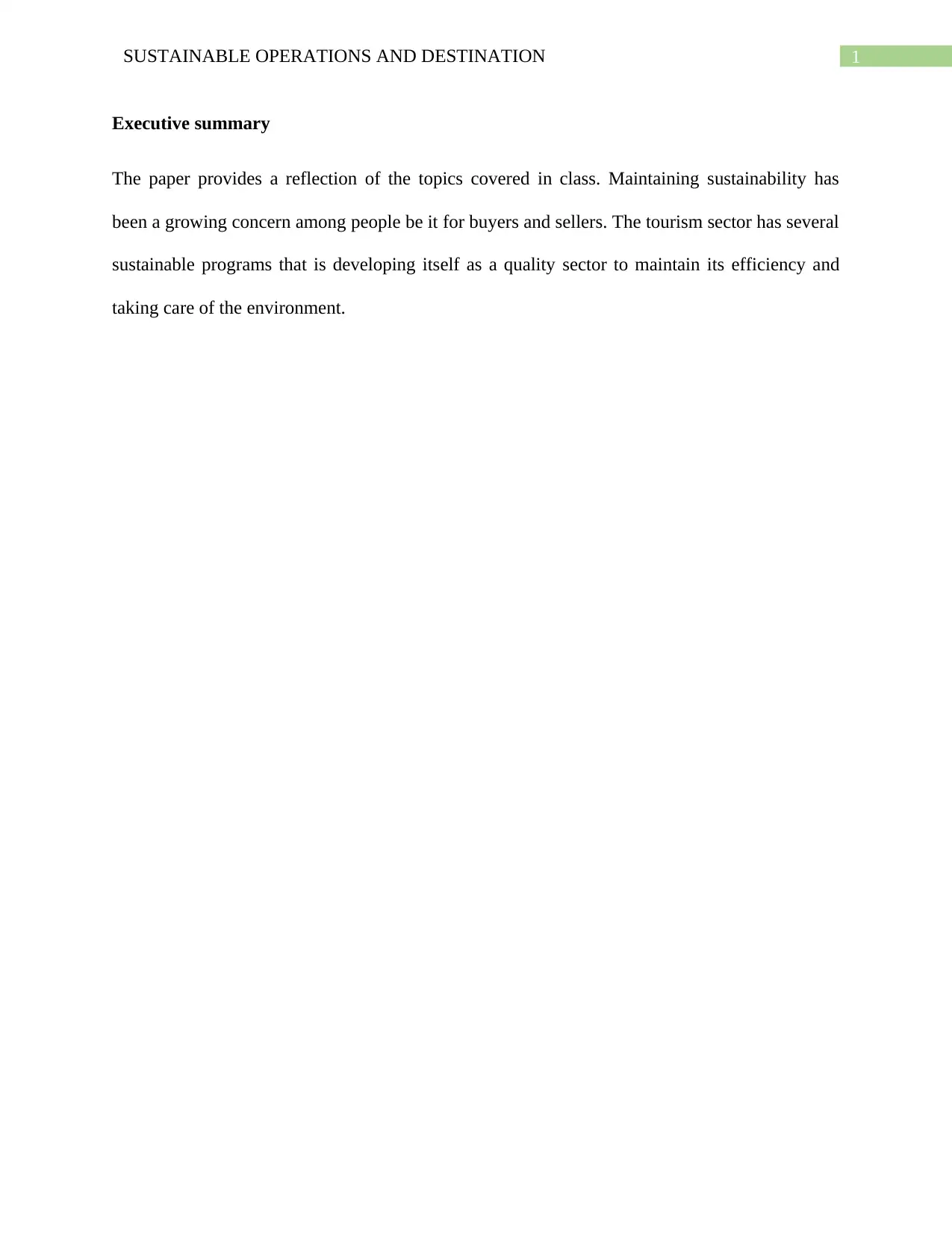
1SUSTAINABLE OPERATIONS AND DESTINATION
Executive summary
The paper provides a reflection of the topics covered in class. Maintaining sustainability has
been a growing concern among people be it for buyers and sellers. The tourism sector has several
sustainable programs that is developing itself as a quality sector to maintain its efficiency and
taking care of the environment.
Executive summary
The paper provides a reflection of the topics covered in class. Maintaining sustainability has
been a growing concern among people be it for buyers and sellers. The tourism sector has several
sustainable programs that is developing itself as a quality sector to maintain its efficiency and
taking care of the environment.
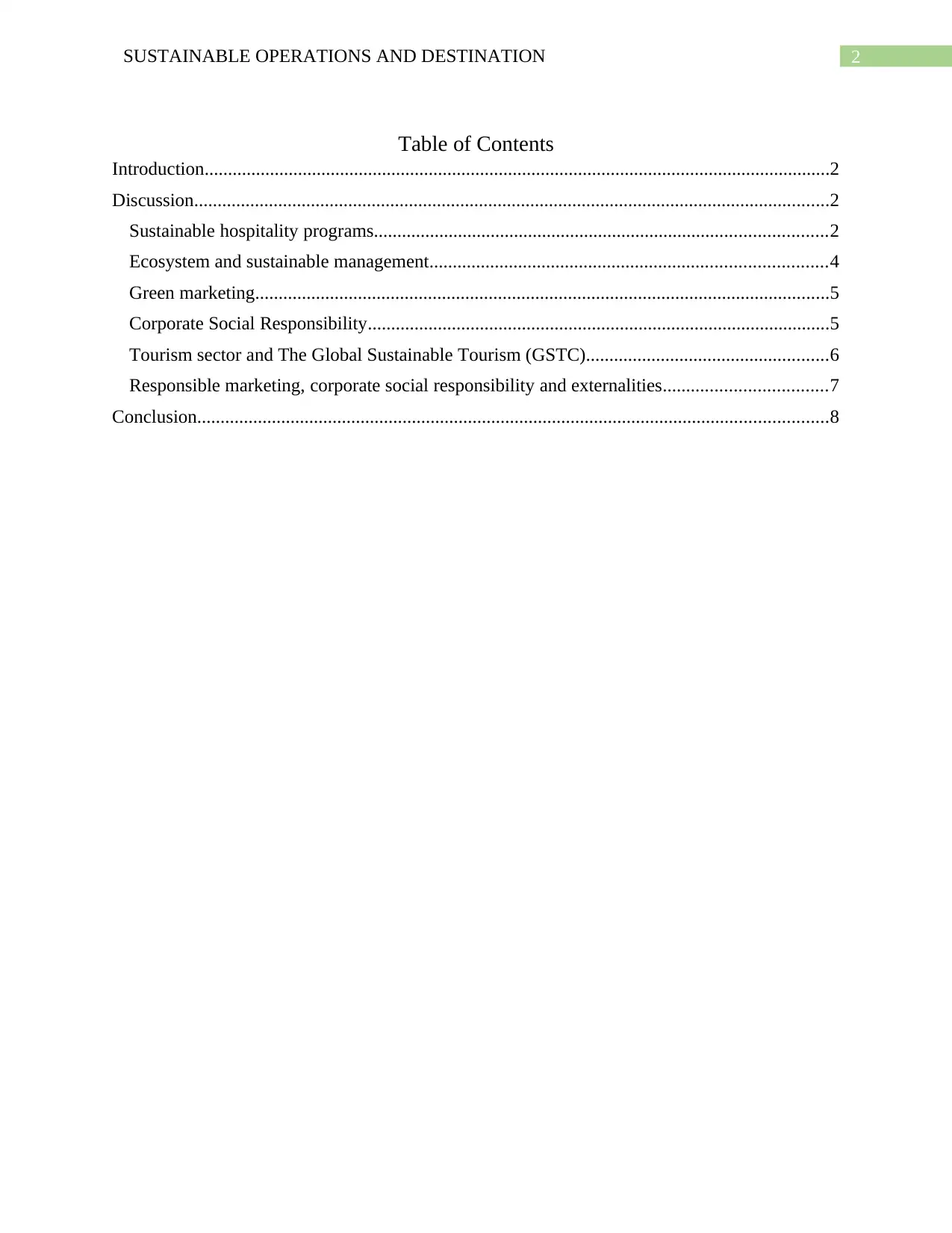
2SUSTAINABLE OPERATIONS AND DESTINATION
Table of Contents
Introduction......................................................................................................................................2
Discussion........................................................................................................................................2
Sustainable hospitality programs.................................................................................................2
Ecosystem and sustainable management.....................................................................................4
Green marketing...........................................................................................................................5
Corporate Social Responsibility...................................................................................................5
Tourism sector and The Global Sustainable Tourism (GSTC)....................................................6
Responsible marketing, corporate social responsibility and externalities...................................7
Conclusion.......................................................................................................................................8
Table of Contents
Introduction......................................................................................................................................2
Discussion........................................................................................................................................2
Sustainable hospitality programs.................................................................................................2
Ecosystem and sustainable management.....................................................................................4
Green marketing...........................................................................................................................5
Corporate Social Responsibility...................................................................................................5
Tourism sector and The Global Sustainable Tourism (GSTC)....................................................6
Responsible marketing, corporate social responsibility and externalities...................................7
Conclusion.......................................................................................................................................8
⊘ This is a preview!⊘
Do you want full access?
Subscribe today to unlock all pages.

Trusted by 1+ million students worldwide
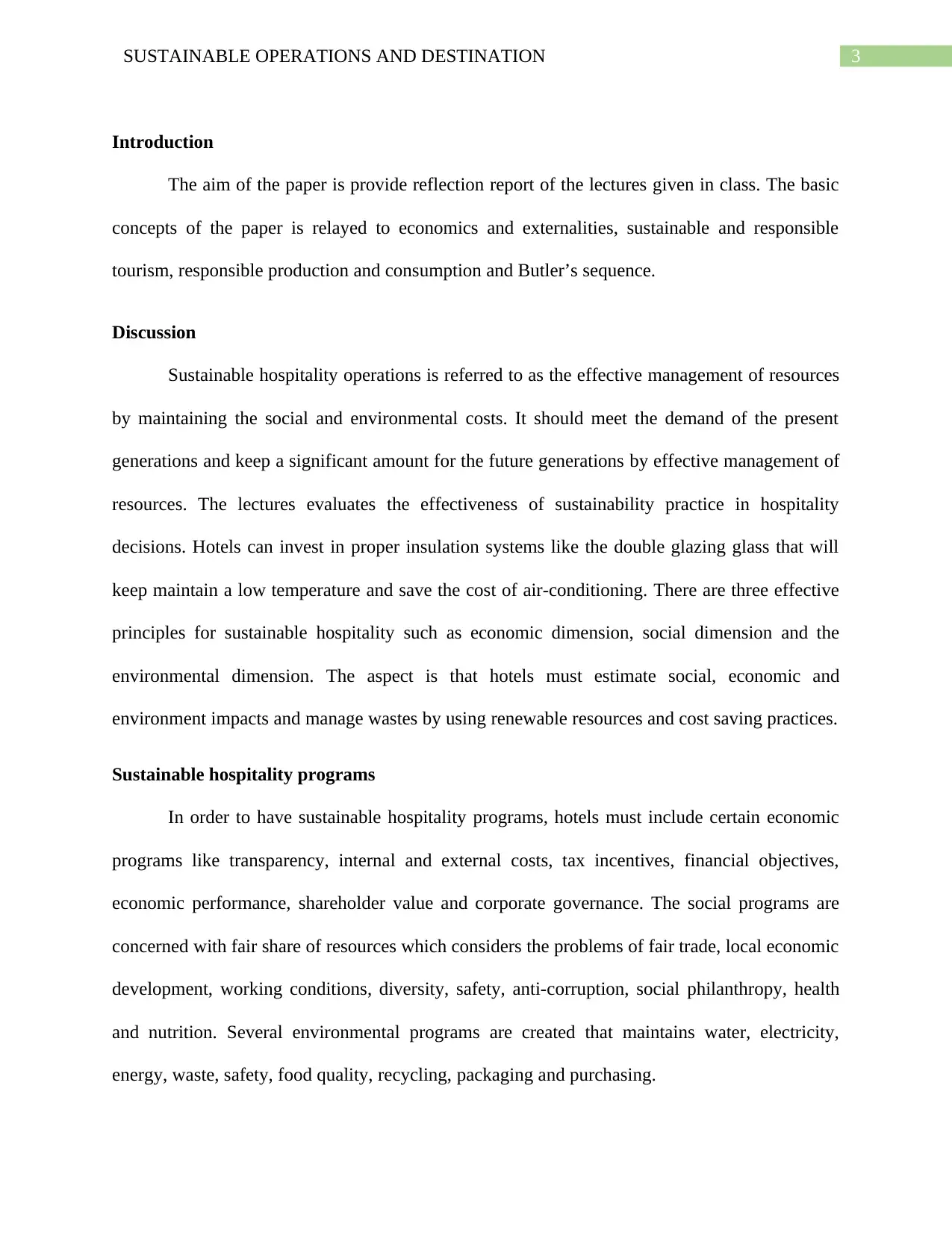
3SUSTAINABLE OPERATIONS AND DESTINATION
Introduction
The aim of the paper is provide reflection report of the lectures given in class. The basic
concepts of the paper is relayed to economics and externalities, sustainable and responsible
tourism, responsible production and consumption and Butler’s sequence.
Discussion
Sustainable hospitality operations is referred to as the effective management of resources
by maintaining the social and environmental costs. It should meet the demand of the present
generations and keep a significant amount for the future generations by effective management of
resources. The lectures evaluates the effectiveness of sustainability practice in hospitality
decisions. Hotels can invest in proper insulation systems like the double glazing glass that will
keep maintain a low temperature and save the cost of air-conditioning. There are three effective
principles for sustainable hospitality such as economic dimension, social dimension and the
environmental dimension. The aspect is that hotels must estimate social, economic and
environment impacts and manage wastes by using renewable resources and cost saving practices.
Sustainable hospitality programs
In order to have sustainable hospitality programs, hotels must include certain economic
programs like transparency, internal and external costs, tax incentives, financial objectives,
economic performance, shareholder value and corporate governance. The social programs are
concerned with fair share of resources which considers the problems of fair trade, local economic
development, working conditions, diversity, safety, anti-corruption, social philanthropy, health
and nutrition. Several environmental programs are created that maintains water, electricity,
energy, waste, safety, food quality, recycling, packaging and purchasing.
Introduction
The aim of the paper is provide reflection report of the lectures given in class. The basic
concepts of the paper is relayed to economics and externalities, sustainable and responsible
tourism, responsible production and consumption and Butler’s sequence.
Discussion
Sustainable hospitality operations is referred to as the effective management of resources
by maintaining the social and environmental costs. It should meet the demand of the present
generations and keep a significant amount for the future generations by effective management of
resources. The lectures evaluates the effectiveness of sustainability practice in hospitality
decisions. Hotels can invest in proper insulation systems like the double glazing glass that will
keep maintain a low temperature and save the cost of air-conditioning. There are three effective
principles for sustainable hospitality such as economic dimension, social dimension and the
environmental dimension. The aspect is that hotels must estimate social, economic and
environment impacts and manage wastes by using renewable resources and cost saving practices.
Sustainable hospitality programs
In order to have sustainable hospitality programs, hotels must include certain economic
programs like transparency, internal and external costs, tax incentives, financial objectives,
economic performance, shareholder value and corporate governance. The social programs are
concerned with fair share of resources which considers the problems of fair trade, local economic
development, working conditions, diversity, safety, anti-corruption, social philanthropy, health
and nutrition. Several environmental programs are created that maintains water, electricity,
energy, waste, safety, food quality, recycling, packaging and purchasing.
Paraphrase This Document
Need a fresh take? Get an instant paraphrase of this document with our AI Paraphraser
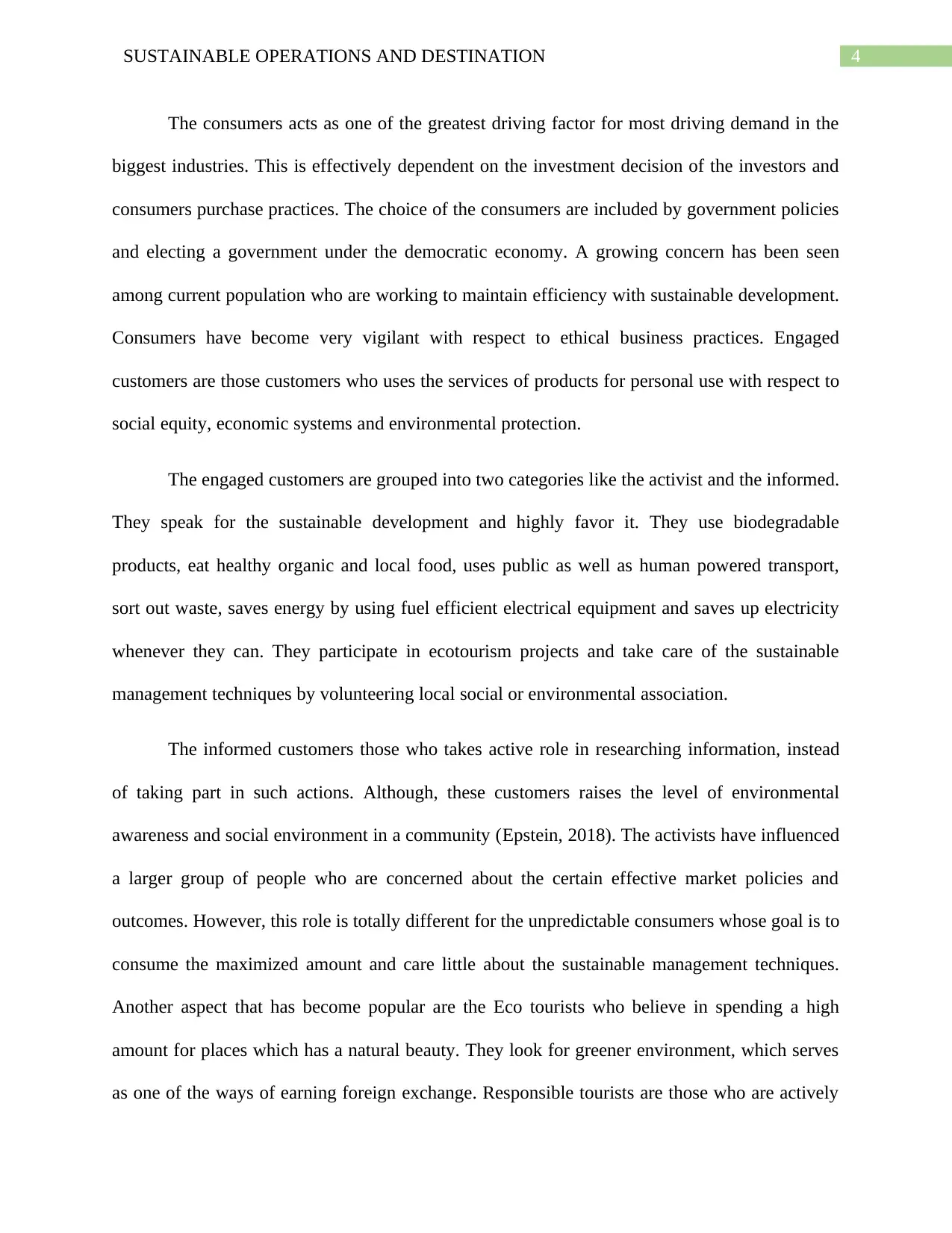
4SUSTAINABLE OPERATIONS AND DESTINATION
The consumers acts as one of the greatest driving factor for most driving demand in the
biggest industries. This is effectively dependent on the investment decision of the investors and
consumers purchase practices. The choice of the consumers are included by government policies
and electing a government under the democratic economy. A growing concern has been seen
among current population who are working to maintain efficiency with sustainable development.
Consumers have become very vigilant with respect to ethical business practices. Engaged
customers are those customers who uses the services of products for personal use with respect to
social equity, economic systems and environmental protection.
The engaged customers are grouped into two categories like the activist and the informed.
They speak for the sustainable development and highly favor it. They use biodegradable
products, eat healthy organic and local food, uses public as well as human powered transport,
sort out waste, saves energy by using fuel efficient electrical equipment and saves up electricity
whenever they can. They participate in ecotourism projects and take care of the sustainable
management techniques by volunteering local social or environmental association.
The informed customers those who takes active role in researching information, instead
of taking part in such actions. Although, these customers raises the level of environmental
awareness and social environment in a community (Epstein, 2018). The activists have influenced
a larger group of people who are concerned about the certain effective market policies and
outcomes. However, this role is totally different for the unpredictable consumers whose goal is to
consume the maximized amount and care little about the sustainable management techniques.
Another aspect that has become popular are the Eco tourists who believe in spending a high
amount for places which has a natural beauty. They look for greener environment, which serves
as one of the ways of earning foreign exchange. Responsible tourists are those who are actively
The consumers acts as one of the greatest driving factor for most driving demand in the
biggest industries. This is effectively dependent on the investment decision of the investors and
consumers purchase practices. The choice of the consumers are included by government policies
and electing a government under the democratic economy. A growing concern has been seen
among current population who are working to maintain efficiency with sustainable development.
Consumers have become very vigilant with respect to ethical business practices. Engaged
customers are those customers who uses the services of products for personal use with respect to
social equity, economic systems and environmental protection.
The engaged customers are grouped into two categories like the activist and the informed.
They speak for the sustainable development and highly favor it. They use biodegradable
products, eat healthy organic and local food, uses public as well as human powered transport,
sort out waste, saves energy by using fuel efficient electrical equipment and saves up electricity
whenever they can. They participate in ecotourism projects and take care of the sustainable
management techniques by volunteering local social or environmental association.
The informed customers those who takes active role in researching information, instead
of taking part in such actions. Although, these customers raises the level of environmental
awareness and social environment in a community (Epstein, 2018). The activists have influenced
a larger group of people who are concerned about the certain effective market policies and
outcomes. However, this role is totally different for the unpredictable consumers whose goal is to
consume the maximized amount and care little about the sustainable management techniques.
Another aspect that has become popular are the Eco tourists who believe in spending a high
amount for places which has a natural beauty. They look for greener environment, which serves
as one of the ways of earning foreign exchange. Responsible tourists are those who are actively
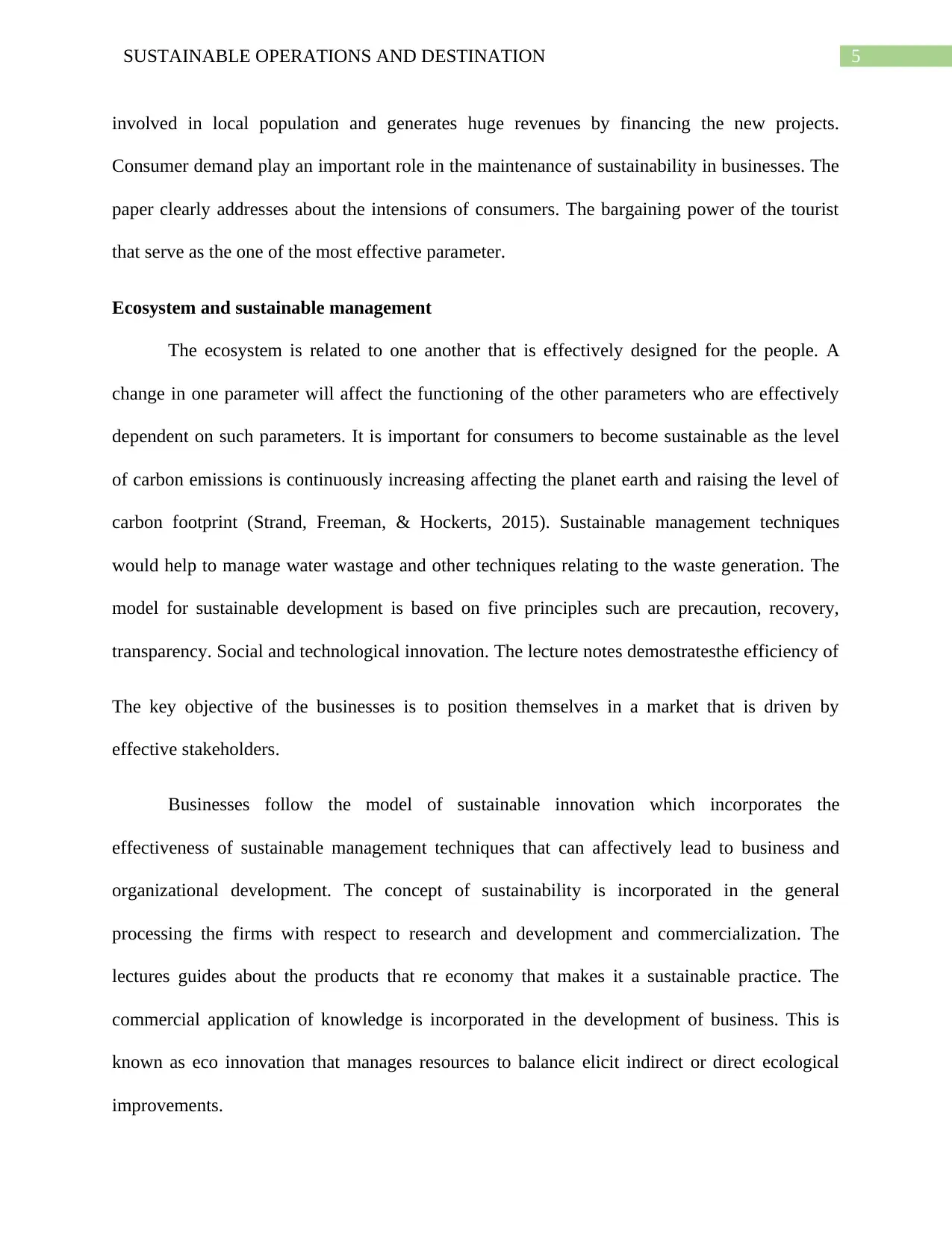
5SUSTAINABLE OPERATIONS AND DESTINATION
involved in local population and generates huge revenues by financing the new projects.
Consumer demand play an important role in the maintenance of sustainability in businesses. The
paper clearly addresses about the intensions of consumers. The bargaining power of the tourist
that serve as the one of the most effective parameter.
Ecosystem and sustainable management
The ecosystem is related to one another that is effectively designed for the people. A
change in one parameter will affect the functioning of the other parameters who are effectively
dependent on such parameters. It is important for consumers to become sustainable as the level
of carbon emissions is continuously increasing affecting the planet earth and raising the level of
carbon footprint (Strand, Freeman, & Hockerts, 2015). Sustainable management techniques
would help to manage water wastage and other techniques relating to the waste generation. The
model for sustainable development is based on five principles such are precaution, recovery,
transparency. Social and technological innovation. The lecture notes demostratesthe efficiency of
The key objective of the businesses is to position themselves in a market that is driven by
effective stakeholders.
Businesses follow the model of sustainable innovation which incorporates the
effectiveness of sustainable management techniques that can affectively lead to business and
organizational development. The concept of sustainability is incorporated in the general
processing the firms with respect to research and development and commercialization. The
lectures guides about the products that re economy that makes it a sustainable practice. The
commercial application of knowledge is incorporated in the development of business. This is
known as eco innovation that manages resources to balance elicit indirect or direct ecological
improvements.
involved in local population and generates huge revenues by financing the new projects.
Consumer demand play an important role in the maintenance of sustainability in businesses. The
paper clearly addresses about the intensions of consumers. The bargaining power of the tourist
that serve as the one of the most effective parameter.
Ecosystem and sustainable management
The ecosystem is related to one another that is effectively designed for the people. A
change in one parameter will affect the functioning of the other parameters who are effectively
dependent on such parameters. It is important for consumers to become sustainable as the level
of carbon emissions is continuously increasing affecting the planet earth and raising the level of
carbon footprint (Strand, Freeman, & Hockerts, 2015). Sustainable management techniques
would help to manage water wastage and other techniques relating to the waste generation. The
model for sustainable development is based on five principles such are precaution, recovery,
transparency. Social and technological innovation. The lecture notes demostratesthe efficiency of
The key objective of the businesses is to position themselves in a market that is driven by
effective stakeholders.
Businesses follow the model of sustainable innovation which incorporates the
effectiveness of sustainable management techniques that can affectively lead to business and
organizational development. The concept of sustainability is incorporated in the general
processing the firms with respect to research and development and commercialization. The
lectures guides about the products that re economy that makes it a sustainable practice. The
commercial application of knowledge is incorporated in the development of business. This is
known as eco innovation that manages resources to balance elicit indirect or direct ecological
improvements.
⊘ This is a preview!⊘
Do you want full access?
Subscribe today to unlock all pages.

Trusted by 1+ million students worldwide
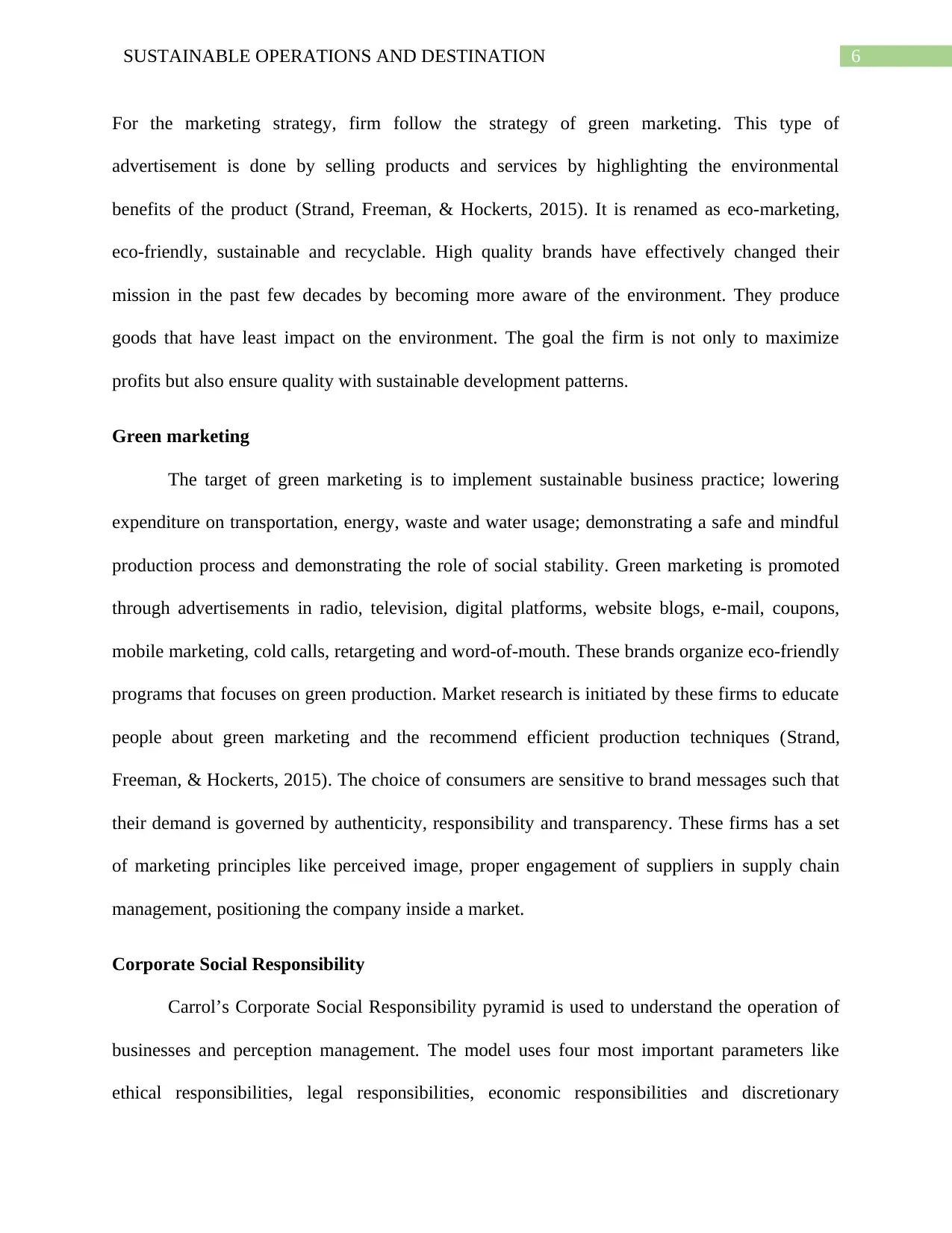
6SUSTAINABLE OPERATIONS AND DESTINATION
For the marketing strategy, firm follow the strategy of green marketing. This type of
advertisement is done by selling products and services by highlighting the environmental
benefits of the product (Strand, Freeman, & Hockerts, 2015). It is renamed as eco-marketing,
eco-friendly, sustainable and recyclable. High quality brands have effectively changed their
mission in the past few decades by becoming more aware of the environment. They produce
goods that have least impact on the environment. The goal the firm is not only to maximize
profits but also ensure quality with sustainable development patterns.
Green marketing
The target of green marketing is to implement sustainable business practice; lowering
expenditure on transportation, energy, waste and water usage; demonstrating a safe and mindful
production process and demonstrating the role of social stability. Green marketing is promoted
through advertisements in radio, television, digital platforms, website blogs, e-mail, coupons,
mobile marketing, cold calls, retargeting and word-of-mouth. These brands organize eco-friendly
programs that focuses on green production. Market research is initiated by these firms to educate
people about green marketing and the recommend efficient production techniques (Strand,
Freeman, & Hockerts, 2015). The choice of consumers are sensitive to brand messages such that
their demand is governed by authenticity, responsibility and transparency. These firms has a set
of marketing principles like perceived image, proper engagement of suppliers in supply chain
management, positioning the company inside a market.
Corporate Social Responsibility
Carrol’s Corporate Social Responsibility pyramid is used to understand the operation of
businesses and perception management. The model uses four most important parameters like
ethical responsibilities, legal responsibilities, economic responsibilities and discretionary
For the marketing strategy, firm follow the strategy of green marketing. This type of
advertisement is done by selling products and services by highlighting the environmental
benefits of the product (Strand, Freeman, & Hockerts, 2015). It is renamed as eco-marketing,
eco-friendly, sustainable and recyclable. High quality brands have effectively changed their
mission in the past few decades by becoming more aware of the environment. They produce
goods that have least impact on the environment. The goal the firm is not only to maximize
profits but also ensure quality with sustainable development patterns.
Green marketing
The target of green marketing is to implement sustainable business practice; lowering
expenditure on transportation, energy, waste and water usage; demonstrating a safe and mindful
production process and demonstrating the role of social stability. Green marketing is promoted
through advertisements in radio, television, digital platforms, website blogs, e-mail, coupons,
mobile marketing, cold calls, retargeting and word-of-mouth. These brands organize eco-friendly
programs that focuses on green production. Market research is initiated by these firms to educate
people about green marketing and the recommend efficient production techniques (Strand,
Freeman, & Hockerts, 2015). The choice of consumers are sensitive to brand messages such that
their demand is governed by authenticity, responsibility and transparency. These firms has a set
of marketing principles like perceived image, proper engagement of suppliers in supply chain
management, positioning the company inside a market.
Corporate Social Responsibility
Carrol’s Corporate Social Responsibility pyramid is used to understand the operation of
businesses and perception management. The model uses four most important parameters like
ethical responsibilities, legal responsibilities, economic responsibilities and discretionary
Paraphrase This Document
Need a fresh take? Get an instant paraphrase of this document with our AI Paraphraser
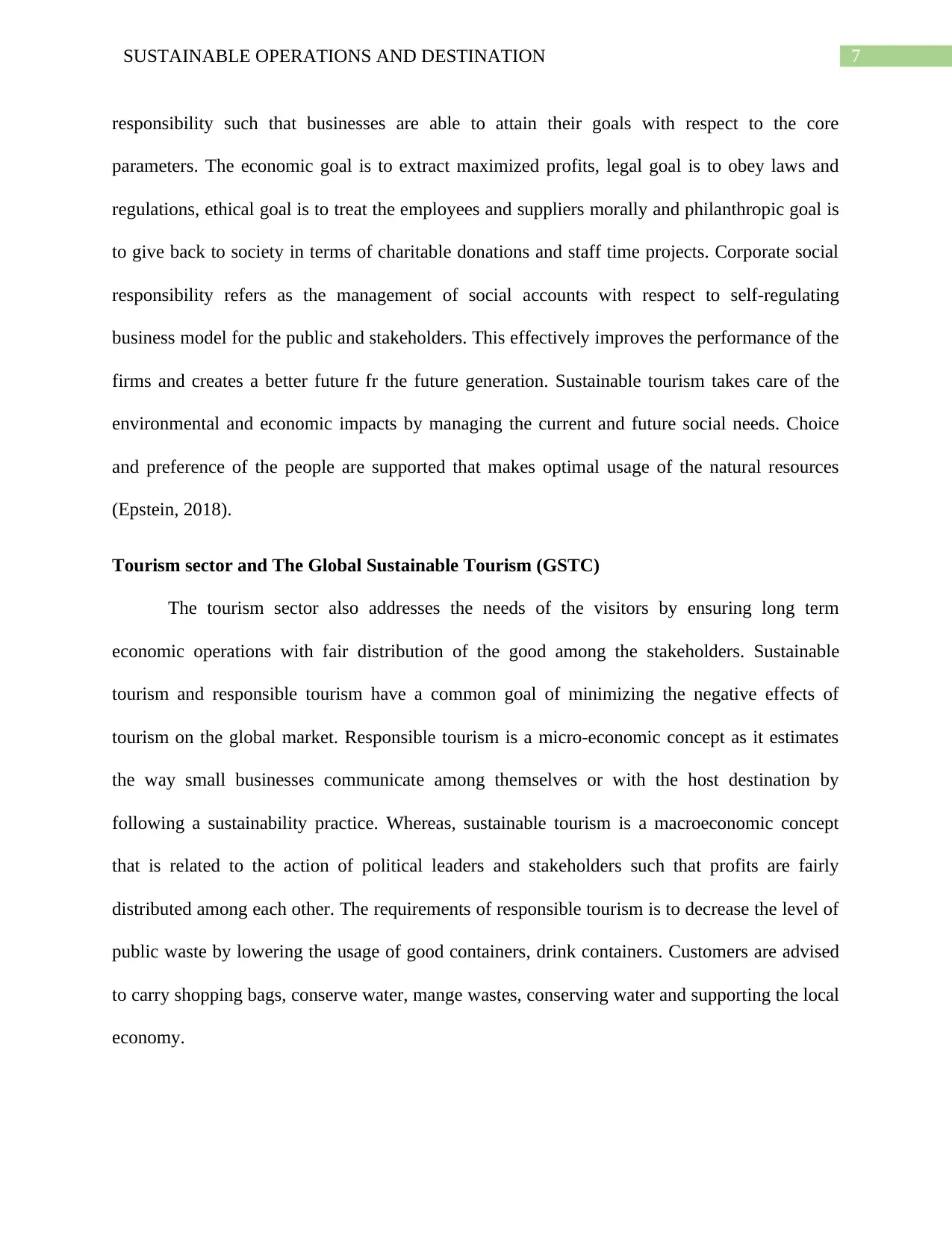
7SUSTAINABLE OPERATIONS AND DESTINATION
responsibility such that businesses are able to attain their goals with respect to the core
parameters. The economic goal is to extract maximized profits, legal goal is to obey laws and
regulations, ethical goal is to treat the employees and suppliers morally and philanthropic goal is
to give back to society in terms of charitable donations and staff time projects. Corporate social
responsibility refers as the management of social accounts with respect to self-regulating
business model for the public and stakeholders. This effectively improves the performance of the
firms and creates a better future fr the future generation. Sustainable tourism takes care of the
environmental and economic impacts by managing the current and future social needs. Choice
and preference of the people are supported that makes optimal usage of the natural resources
(Epstein, 2018).
Tourism sector and The Global Sustainable Tourism (GSTC)
The tourism sector also addresses the needs of the visitors by ensuring long term
economic operations with fair distribution of the good among the stakeholders. Sustainable
tourism and responsible tourism have a common goal of minimizing the negative effects of
tourism on the global market. Responsible tourism is a micro-economic concept as it estimates
the way small businesses communicate among themselves or with the host destination by
following a sustainability practice. Whereas, sustainable tourism is a macroeconomic concept
that is related to the action of political leaders and stakeholders such that profits are fairly
distributed among each other. The requirements of responsible tourism is to decrease the level of
public waste by lowering the usage of good containers, drink containers. Customers are advised
to carry shopping bags, conserve water, mange wastes, conserving water and supporting the local
economy.
responsibility such that businesses are able to attain their goals with respect to the core
parameters. The economic goal is to extract maximized profits, legal goal is to obey laws and
regulations, ethical goal is to treat the employees and suppliers morally and philanthropic goal is
to give back to society in terms of charitable donations and staff time projects. Corporate social
responsibility refers as the management of social accounts with respect to self-regulating
business model for the public and stakeholders. This effectively improves the performance of the
firms and creates a better future fr the future generation. Sustainable tourism takes care of the
environmental and economic impacts by managing the current and future social needs. Choice
and preference of the people are supported that makes optimal usage of the natural resources
(Epstein, 2018).
Tourism sector and The Global Sustainable Tourism (GSTC)
The tourism sector also addresses the needs of the visitors by ensuring long term
economic operations with fair distribution of the good among the stakeholders. Sustainable
tourism and responsible tourism have a common goal of minimizing the negative effects of
tourism on the global market. Responsible tourism is a micro-economic concept as it estimates
the way small businesses communicate among themselves or with the host destination by
following a sustainability practice. Whereas, sustainable tourism is a macroeconomic concept
that is related to the action of political leaders and stakeholders such that profits are fairly
distributed among each other. The requirements of responsible tourism is to decrease the level of
public waste by lowering the usage of good containers, drink containers. Customers are advised
to carry shopping bags, conserve water, mange wastes, conserving water and supporting the local
economy.
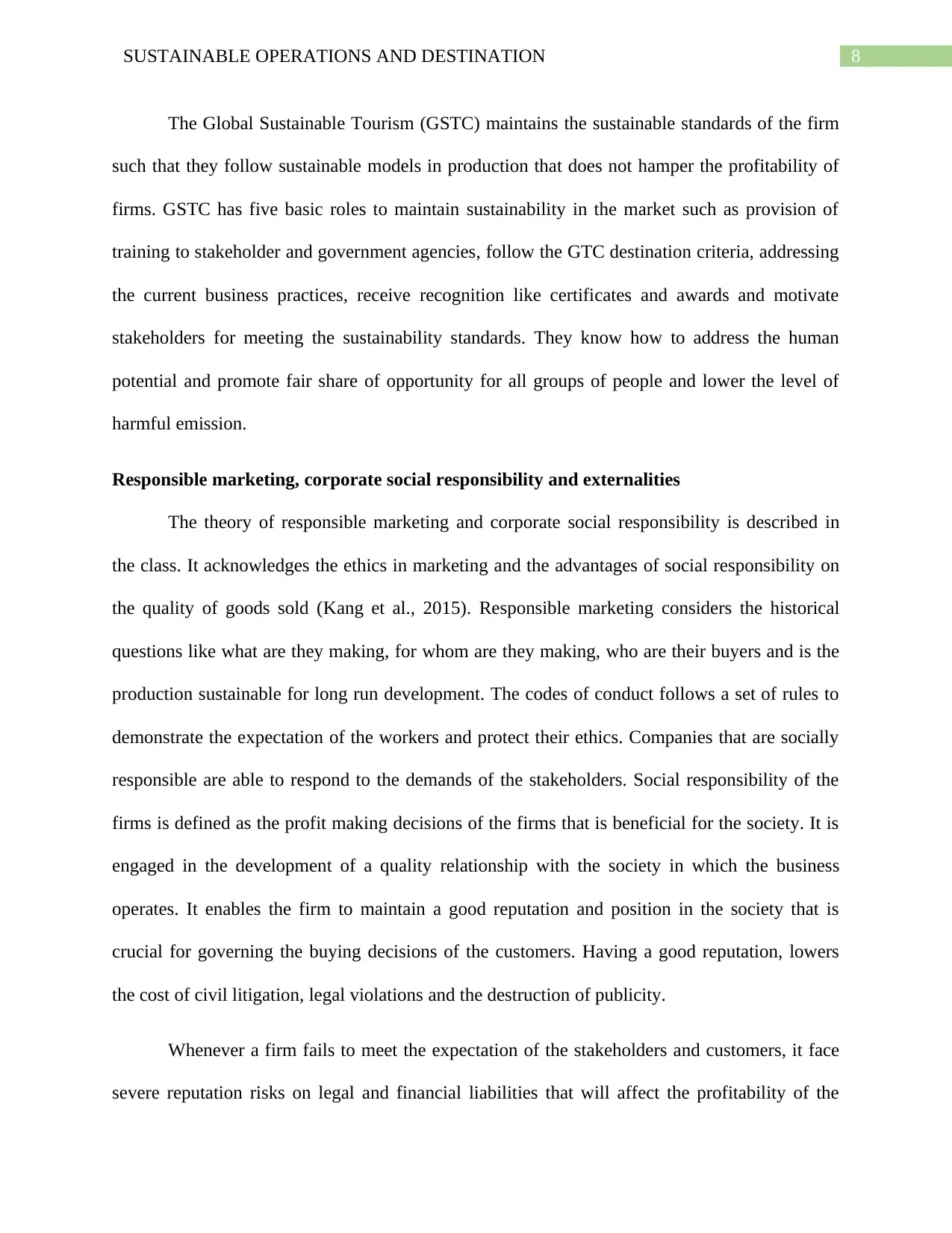
8SUSTAINABLE OPERATIONS AND DESTINATION
The Global Sustainable Tourism (GSTC) maintains the sustainable standards of the firm
such that they follow sustainable models in production that does not hamper the profitability of
firms. GSTC has five basic roles to maintain sustainability in the market such as provision of
training to stakeholder and government agencies, follow the GTC destination criteria, addressing
the current business practices, receive recognition like certificates and awards and motivate
stakeholders for meeting the sustainability standards. They know how to address the human
potential and promote fair share of opportunity for all groups of people and lower the level of
harmful emission.
Responsible marketing, corporate social responsibility and externalities
The theory of responsible marketing and corporate social responsibility is described in
the class. It acknowledges the ethics in marketing and the advantages of social responsibility on
the quality of goods sold (Kang et al., 2015). Responsible marketing considers the historical
questions like what are they making, for whom are they making, who are their buyers and is the
production sustainable for long run development. The codes of conduct follows a set of rules to
demonstrate the expectation of the workers and protect their ethics. Companies that are socially
responsible are able to respond to the demands of the stakeholders. Social responsibility of the
firms is defined as the profit making decisions of the firms that is beneficial for the society. It is
engaged in the development of a quality relationship with the society in which the business
operates. It enables the firm to maintain a good reputation and position in the society that is
crucial for governing the buying decisions of the customers. Having a good reputation, lowers
the cost of civil litigation, legal violations and the destruction of publicity.
Whenever a firm fails to meet the expectation of the stakeholders and customers, it face
severe reputation risks on legal and financial liabilities that will affect the profitability of the
The Global Sustainable Tourism (GSTC) maintains the sustainable standards of the firm
such that they follow sustainable models in production that does not hamper the profitability of
firms. GSTC has five basic roles to maintain sustainability in the market such as provision of
training to stakeholder and government agencies, follow the GTC destination criteria, addressing
the current business practices, receive recognition like certificates and awards and motivate
stakeholders for meeting the sustainability standards. They know how to address the human
potential and promote fair share of opportunity for all groups of people and lower the level of
harmful emission.
Responsible marketing, corporate social responsibility and externalities
The theory of responsible marketing and corporate social responsibility is described in
the class. It acknowledges the ethics in marketing and the advantages of social responsibility on
the quality of goods sold (Kang et al., 2015). Responsible marketing considers the historical
questions like what are they making, for whom are they making, who are their buyers and is the
production sustainable for long run development. The codes of conduct follows a set of rules to
demonstrate the expectation of the workers and protect their ethics. Companies that are socially
responsible are able to respond to the demands of the stakeholders. Social responsibility of the
firms is defined as the profit making decisions of the firms that is beneficial for the society. It is
engaged in the development of a quality relationship with the society in which the business
operates. It enables the firm to maintain a good reputation and position in the society that is
crucial for governing the buying decisions of the customers. Having a good reputation, lowers
the cost of civil litigation, legal violations and the destruction of publicity.
Whenever a firm fails to meet the expectation of the stakeholders and customers, it face
severe reputation risks on legal and financial liabilities that will affect the profitability of the
⊘ This is a preview!⊘
Do you want full access?
Subscribe today to unlock all pages.

Trusted by 1+ million students worldwide
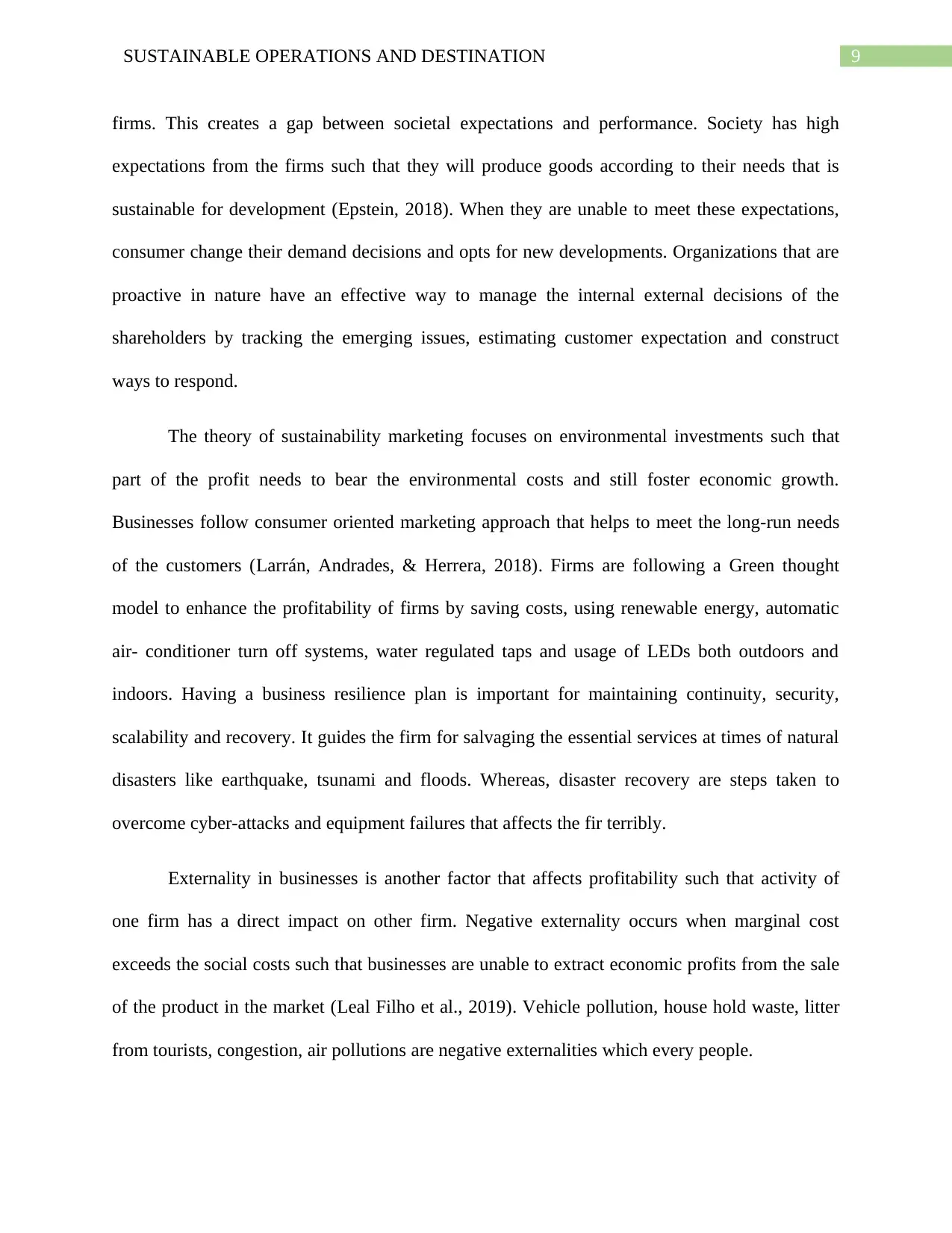
9SUSTAINABLE OPERATIONS AND DESTINATION
firms. This creates a gap between societal expectations and performance. Society has high
expectations from the firms such that they will produce goods according to their needs that is
sustainable for development (Epstein, 2018). When they are unable to meet these expectations,
consumer change their demand decisions and opts for new developments. Organizations that are
proactive in nature have an effective way to manage the internal external decisions of the
shareholders by tracking the emerging issues, estimating customer expectation and construct
ways to respond.
The theory of sustainability marketing focuses on environmental investments such that
part of the profit needs to bear the environmental costs and still foster economic growth.
Businesses follow consumer oriented marketing approach that helps to meet the long-run needs
of the customers (Larrán, Andrades, & Herrera, 2018). Firms are following a Green thought
model to enhance the profitability of firms by saving costs, using renewable energy, automatic
air- conditioner turn off systems, water regulated taps and usage of LEDs both outdoors and
indoors. Having a business resilience plan is important for maintaining continuity, security,
scalability and recovery. It guides the firm for salvaging the essential services at times of natural
disasters like earthquake, tsunami and floods. Whereas, disaster recovery are steps taken to
overcome cyber-attacks and equipment failures that affects the fir terribly.
Externality in businesses is another factor that affects profitability such that activity of
one firm has a direct impact on other firm. Negative externality occurs when marginal cost
exceeds the social costs such that businesses are unable to extract economic profits from the sale
of the product in the market (Leal Filho et al., 2019). Vehicle pollution, house hold waste, litter
from tourists, congestion, air pollutions are negative externalities which every people.
firms. This creates a gap between societal expectations and performance. Society has high
expectations from the firms such that they will produce goods according to their needs that is
sustainable for development (Epstein, 2018). When they are unable to meet these expectations,
consumer change their demand decisions and opts for new developments. Organizations that are
proactive in nature have an effective way to manage the internal external decisions of the
shareholders by tracking the emerging issues, estimating customer expectation and construct
ways to respond.
The theory of sustainability marketing focuses on environmental investments such that
part of the profit needs to bear the environmental costs and still foster economic growth.
Businesses follow consumer oriented marketing approach that helps to meet the long-run needs
of the customers (Larrán, Andrades, & Herrera, 2018). Firms are following a Green thought
model to enhance the profitability of firms by saving costs, using renewable energy, automatic
air- conditioner turn off systems, water regulated taps and usage of LEDs both outdoors and
indoors. Having a business resilience plan is important for maintaining continuity, security,
scalability and recovery. It guides the firm for salvaging the essential services at times of natural
disasters like earthquake, tsunami and floods. Whereas, disaster recovery are steps taken to
overcome cyber-attacks and equipment failures that affects the fir terribly.
Externality in businesses is another factor that affects profitability such that activity of
one firm has a direct impact on other firm. Negative externality occurs when marginal cost
exceeds the social costs such that businesses are unable to extract economic profits from the sale
of the product in the market (Leal Filho et al., 2019). Vehicle pollution, house hold waste, litter
from tourists, congestion, air pollutions are negative externalities which every people.
Paraphrase This Document
Need a fresh take? Get an instant paraphrase of this document with our AI Paraphraser
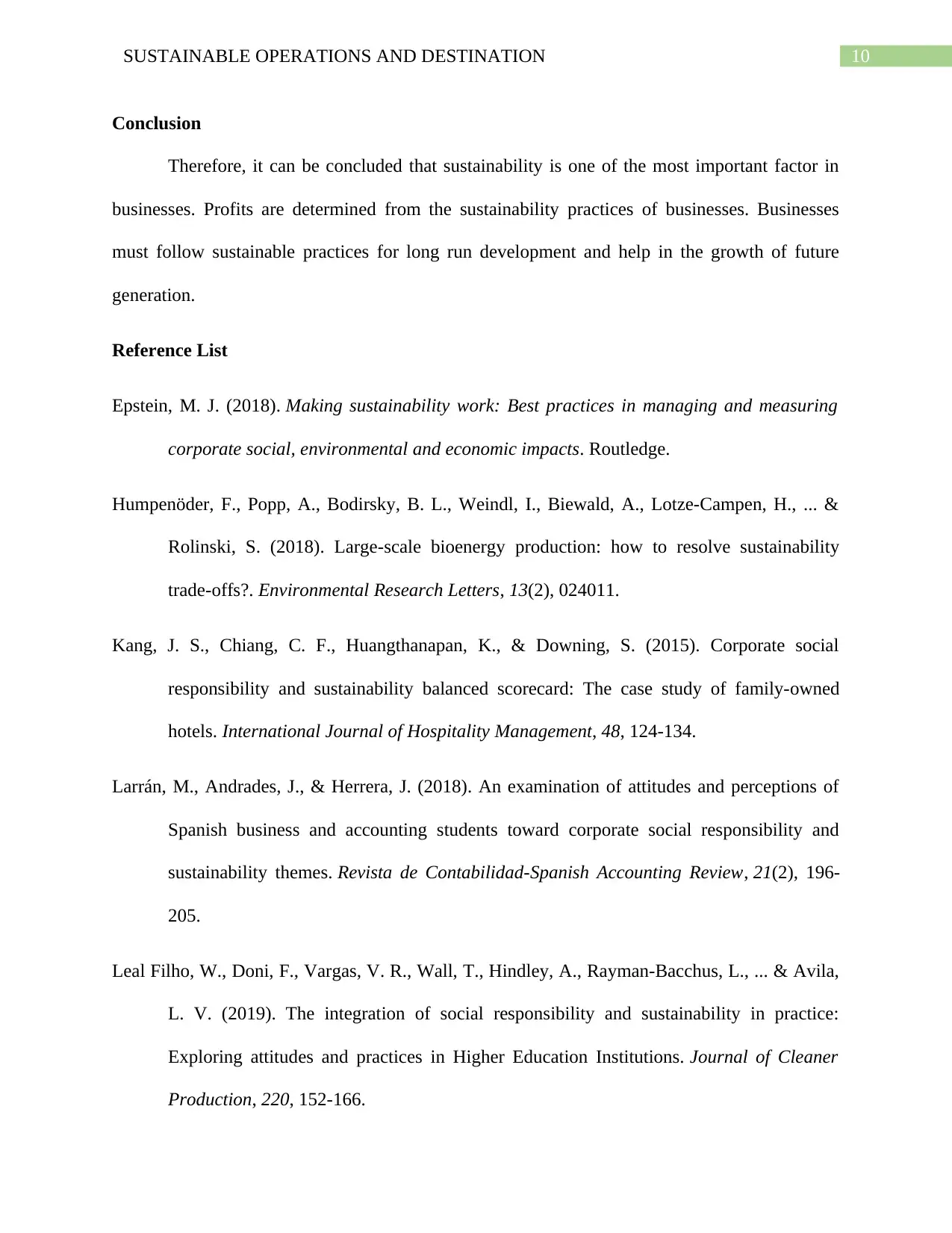
10SUSTAINABLE OPERATIONS AND DESTINATION
Conclusion
Therefore, it can be concluded that sustainability is one of the most important factor in
businesses. Profits are determined from the sustainability practices of businesses. Businesses
must follow sustainable practices for long run development and help in the growth of future
generation.
Reference List
Epstein, M. J. (2018). Making sustainability work: Best practices in managing and measuring
corporate social, environmental and economic impacts. Routledge.
Humpenöder, F., Popp, A., Bodirsky, B. L., Weindl, I., Biewald, A., Lotze-Campen, H., ... &
Rolinski, S. (2018). Large-scale bioenergy production: how to resolve sustainability
trade-offs?. Environmental Research Letters, 13(2), 024011.
Kang, J. S., Chiang, C. F., Huangthanapan, K., & Downing, S. (2015). Corporate social
responsibility and sustainability balanced scorecard: The case study of family-owned
hotels. International Journal of Hospitality Management, 48, 124-134.
Larrán, M., Andrades, J., & Herrera, J. (2018). An examination of attitudes and perceptions of
Spanish business and accounting students toward corporate social responsibility and
sustainability themes. Revista de Contabilidad-Spanish Accounting Review, 21(2), 196-
205.
Leal Filho, W., Doni, F., Vargas, V. R., Wall, T., Hindley, A., Rayman-Bacchus, L., ... & Avila,
L. V. (2019). The integration of social responsibility and sustainability in practice:
Exploring attitudes and practices in Higher Education Institutions. Journal of Cleaner
Production, 220, 152-166.
Conclusion
Therefore, it can be concluded that sustainability is one of the most important factor in
businesses. Profits are determined from the sustainability practices of businesses. Businesses
must follow sustainable practices for long run development and help in the growth of future
generation.
Reference List
Epstein, M. J. (2018). Making sustainability work: Best practices in managing and measuring
corporate social, environmental and economic impacts. Routledge.
Humpenöder, F., Popp, A., Bodirsky, B. L., Weindl, I., Biewald, A., Lotze-Campen, H., ... &
Rolinski, S. (2018). Large-scale bioenergy production: how to resolve sustainability
trade-offs?. Environmental Research Letters, 13(2), 024011.
Kang, J. S., Chiang, C. F., Huangthanapan, K., & Downing, S. (2015). Corporate social
responsibility and sustainability balanced scorecard: The case study of family-owned
hotels. International Journal of Hospitality Management, 48, 124-134.
Larrán, M., Andrades, J., & Herrera, J. (2018). An examination of attitudes and perceptions of
Spanish business and accounting students toward corporate social responsibility and
sustainability themes. Revista de Contabilidad-Spanish Accounting Review, 21(2), 196-
205.
Leal Filho, W., Doni, F., Vargas, V. R., Wall, T., Hindley, A., Rayman-Bacchus, L., ... & Avila,
L. V. (2019). The integration of social responsibility and sustainability in practice:
Exploring attitudes and practices in Higher Education Institutions. Journal of Cleaner
Production, 220, 152-166.
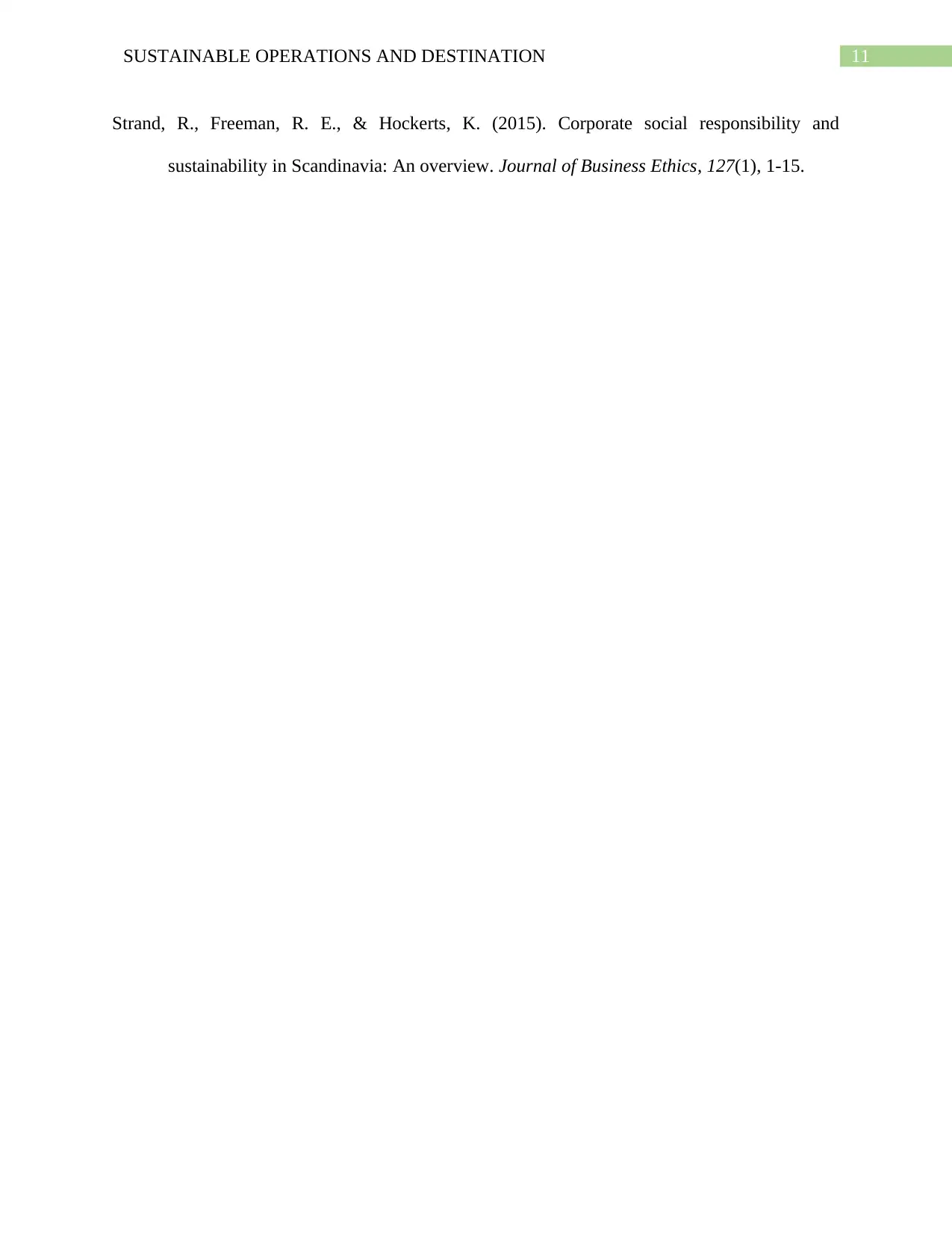
11SUSTAINABLE OPERATIONS AND DESTINATION
Strand, R., Freeman, R. E., & Hockerts, K. (2015). Corporate social responsibility and
sustainability in Scandinavia: An overview. Journal of Business Ethics, 127(1), 1-15.
Strand, R., Freeman, R. E., & Hockerts, K. (2015). Corporate social responsibility and
sustainability in Scandinavia: An overview. Journal of Business Ethics, 127(1), 1-15.
⊘ This is a preview!⊘
Do you want full access?
Subscribe today to unlock all pages.

Trusted by 1+ million students worldwide
1 out of 12